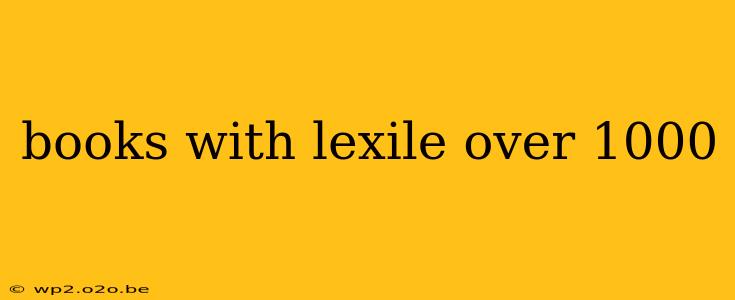Finding books with a Lexile score above 1000 can be challenging, as this signifies exceptionally complex vocabulary and sentence structures. These texts are generally aimed at advanced high school students, college students, and sophisticated adult readers. This guide provides a curated list of titles, categorized for easier navigation, along with insights into what makes them so challenging and rewarding.
Understanding Lexile Scores and Their Significance
Before diving into the book recommendations, let's briefly clarify what a Lexile score represents. The Lexile Framework measures both the readability and complexity of a text. A higher Lexile score indicates a more demanding read, requiring a greater level of vocabulary knowledge and comprehension skills. A score over 1000 places a book firmly in the advanced reading category, suitable for readers with a strong grasp of the English language and a willingness to engage with intricate narratives and nuanced prose. It's crucial to remember that Lexile scores are just one measure of complexity; personal reading experience will always play a significant role.
Categories of Books with Lexile Scores Over 1000
While obtaining precise Lexile scores for every book can be difficult (scores can vary based on edition and assessment method), we've categorized books generally recognized for their high reading level and complex language.
Classic Literature:
-
"Moby Dick" by Herman Melville: This epic tale of obsession and revenge is renowned for its dense prose, archaic language, and philosophical depth. Melville's mastery of language and imagery creates a reading experience demanding patience and attention.
-
"War and Peace" by Leo Tolstoy: A sprawling historical novel covering the Napoleonic Wars, this book demands significant commitment due to its length, intricate plotlines, and detailed character development. Tolstoy's prose is both richly descriptive and psychologically penetrating.
-
"Ulysses" by James Joyce: Known for its experimental style and stream-of-consciousness narrative, "Ulysses" is a landmark of modernist literature. Its challenging vocabulary, complex sentence structures, and allusions to classical literature demand a deep understanding of literary techniques.
-
"The Great Gatsby" by F. Scott Fitzgerald: While perhaps less overtly challenging than the previous examples, Fitzgerald's prose is sophisticated and subtly complex, exploring themes of wealth, class, and the American Dream with sharp observation and evocative imagery. The nuances of the language contribute to the novel's enduring power.
Contemporary Fiction and Non-Fiction:
-
Works by Cormac McCarthy: McCarthy's stark prose style, often devoid of quotation marks and employing a minimalist approach, can be incredibly challenging. Books like "The Road" and "Blood Meridian" offer intense, morally ambiguous narratives that require careful consideration.
-
Works by Thomas Pynchon: Pynchon is known for his complex, postmodern narratives laden with allusions, historical references, and highly intricate plots. His books demand both intellectual curiosity and a high tolerance for ambiguity.
-
Academic Textbooks in Specialized Fields: Textbooks in fields like physics, advanced mathematics, or specialized areas of law or medicine often surpass a Lexile score of 1000 due to their dense technical language and complex concepts. These are not typically considered 'pleasure reading' but are vital for advanced learning.
Tips for Reading Books with High Lexile Scores
Tackling books with a Lexile score above 1000 requires a strategic approach:
-
Build your vocabulary: Regularly consult a dictionary and actively learn new words encountered in your reading.
-
Read actively: Take notes, annotate passages, and reflect on the text’s meaning.
-
Break it down: Don't feel pressured to read lengthy texts in one sitting. Break down your reading into manageable chunks.
-
Seek support: Discuss the book with others who have read it, or join a book club to gain different perspectives.
This list isn't exhaustive, but it provides a starting point for readers seeking intellectually stimulating and challenging literary experiences. Remember that the journey of tackling these complex works is as rewarding as the destination, fostering intellectual growth and enriching your understanding of language and literature.

